Task management solutions are becoming increasingly important in today’s fast-paced business world. Knowing which options are the best can be difficult with so many options available. Let’s look at the best task management software options in 2024.
Whether you need customizable features, collaboration tools, or a user-friendly interface, we’ve got you covered. So, let’s dive in and find the best task management tool for you.
What is a Task Management Software?
According to Indeed, continuously developing and improving task management skills is essential in moving your career forward. One proven way to do so is by implementing a robust technology in your workflow. This is where task management software comes in handy.
Task management software is a digital application that helps teams organize, track, and manage tasks effectively for personal tasks and collective team priorities.
Users can centralize task lists, create to-do lists, and prioritize dependencies within a single task management app to manage deadlines, roadblocks, and tasks.
Most modern task management software helps to strengthen productivity with these features:
- Task creation and assignment
- Prioritization of task dependencies
- Alerts and notifications
- Automation and workflows
- Team collaboration functions
What Makes a Great Task Management Software?
Make sure to choose a robust software that supports the following task management features:
- User-focused interface: Your tool should support visual task management through a user-focused interface to enhance the overall task-handling experience.
- Comprehensive feature set: It should offer time and resource management, task assignment, and project planning features to cater to versatile task needs.
- Task visualization: Task management tools are great for small teams and individuals, allowing easy task creation and tracking via customizable cards and boards.
- Holistic impact: It should enable stakeholders to efficiently manage tasks by creating, monitoring, tracking, and verifying their status and alignment with the plan.
- Team-focused: It should allow teams to collaboratively engage in task management, fostering a more unified and efficient approach to team-based projects.
- Accessible anywhere: The app must support work continuity and flexibility with outstanding uptime for user access.
10 Best Task Management Software in 2024
Task management can be a challenging endeavor, especially when working across teams. That’s why we’ve rounded up the 10 best task management software solutions on the market. From project tracking to team collaboration, these tools have got you covered.
- Monday.com – Best overall
- ClickUp – Best for budget-conscious businesses
- Todoist – Best for simple task management
- Trello – Best for SMEs and startups
- Asana – Best for managing large teams
- Basecamp – Best for flat-fee pricing
- Wrike – Best for progress tracking
- Smartsheet – Best for Spreadsheet users
- Teamwork – Best for managing remote teams
- Ahsuite – Best for client collaboration
1. Monday.com
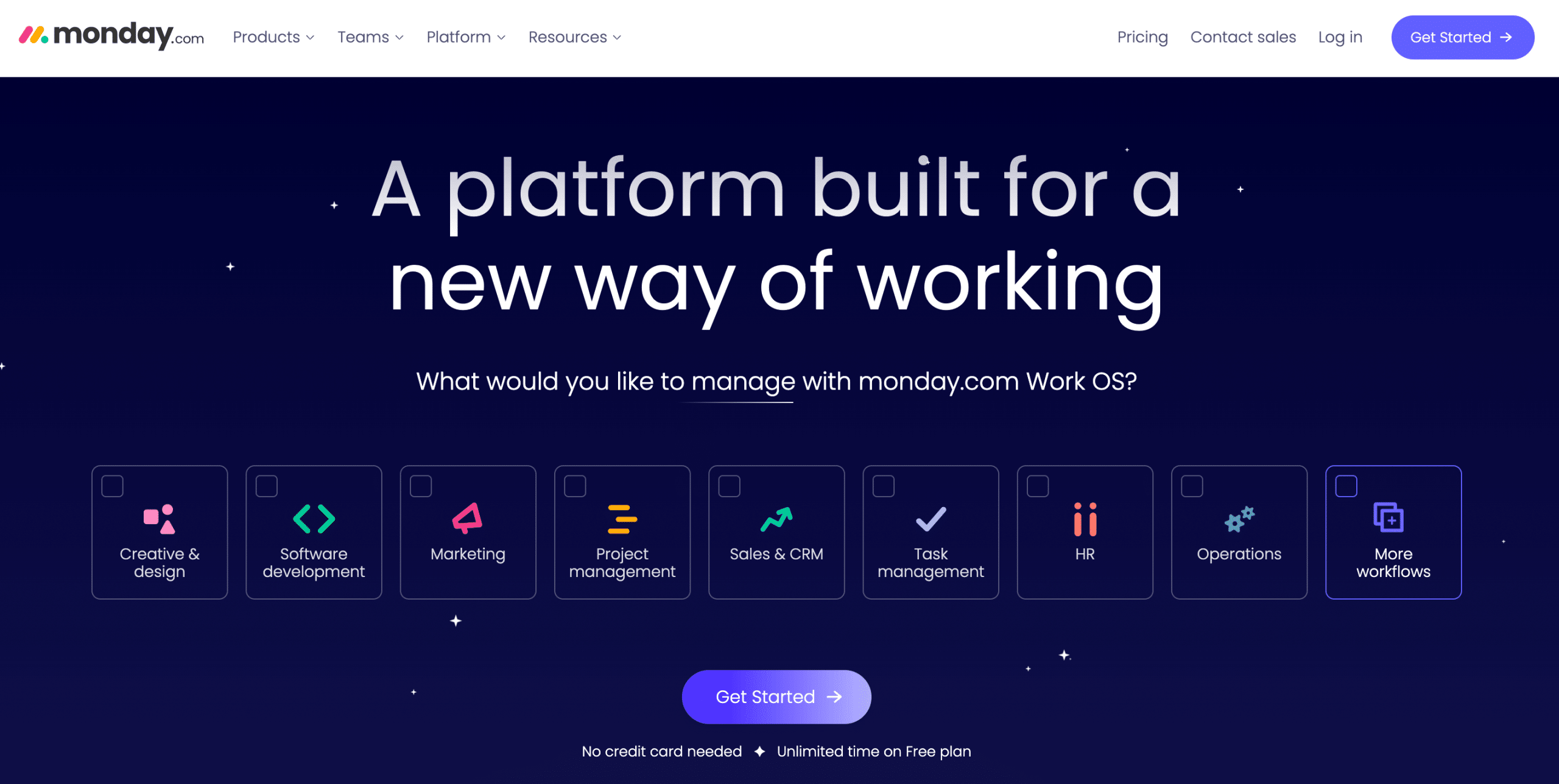
Renowned as one of the best task management software options, Monday.com blends adaptability, user-friendliness, and powerful features. It’s designed to meet various task management needs and is ideal for diverse team and project scenarios.
This tool redefines task management with various customizable views, including Kanban boards and Gantt charts. Its automated workflows, real-time collaboration, and robust integrations with platforms like Slack and Zoom reinforce its status as a leading choice in task management.
Pros:
- Intuitive interface, accessible for all skill levels.
- Adaptable for various project needs.
- Wide-ranging task management functionalities.
- Promotes transparency in project progress.
- Extensive integrations with other apps.
Cons:
- The initial learning curve with the feature-rich environment.
- Higher plans can be costly for small teams.
- Custom reporting has certain limitations.
- Potential clutter with over-customization.
- Customer support quality may vary.
Pricing & Plans:
- Basic Plan ($8)
- Standard Plan ($10)
- Pro Plan ($16)
Customer Ratings:
- G2: 4.7 out 5 (9861 reviews)
- Capterra: 4.6 out 5 (4492 reviews)
Related: 10 Best Monday.com Alternatives
2. ClickUp

ClickUp is the ideal choice for budget-conscious businesses, offering a robust free plan that expertly handles even one task efficiently. You can use customizable dashboards and powerful search features to manage tasks effectively without overspending.
This tool provides budget-friendly solutions, even for managing just one task. Its generous free plan includes essential tools like customizable views, powerful automation, and seamless integrations with key digital tools.
Pros:
- Extensive features in the free plan.
- Customizable for diverse project needs.
- Task automation streamlines workflows.
- Integrates well with popular digital tools.
- Built-in communication and document management.
Cons:
- Notifications can be overwhelming.
- Room for improvement in analytics.
- User reorientation is needed with updates.
- Mobile app functionality needs enhancement.
- The learning curve is steep for newcomers.
Pricing & Plans:
- Unlimited Plan ($5)
- Business Plan ($9)
- Enterprise Plan (Contact Sales)
Customer Ratings:
- G2: 4.7 out 5 (9201 reviews)
- Capterra: 4.7 out 5 (3948 reviews)
Related: 10 Best ClickUp Alternatives
3. Todoist
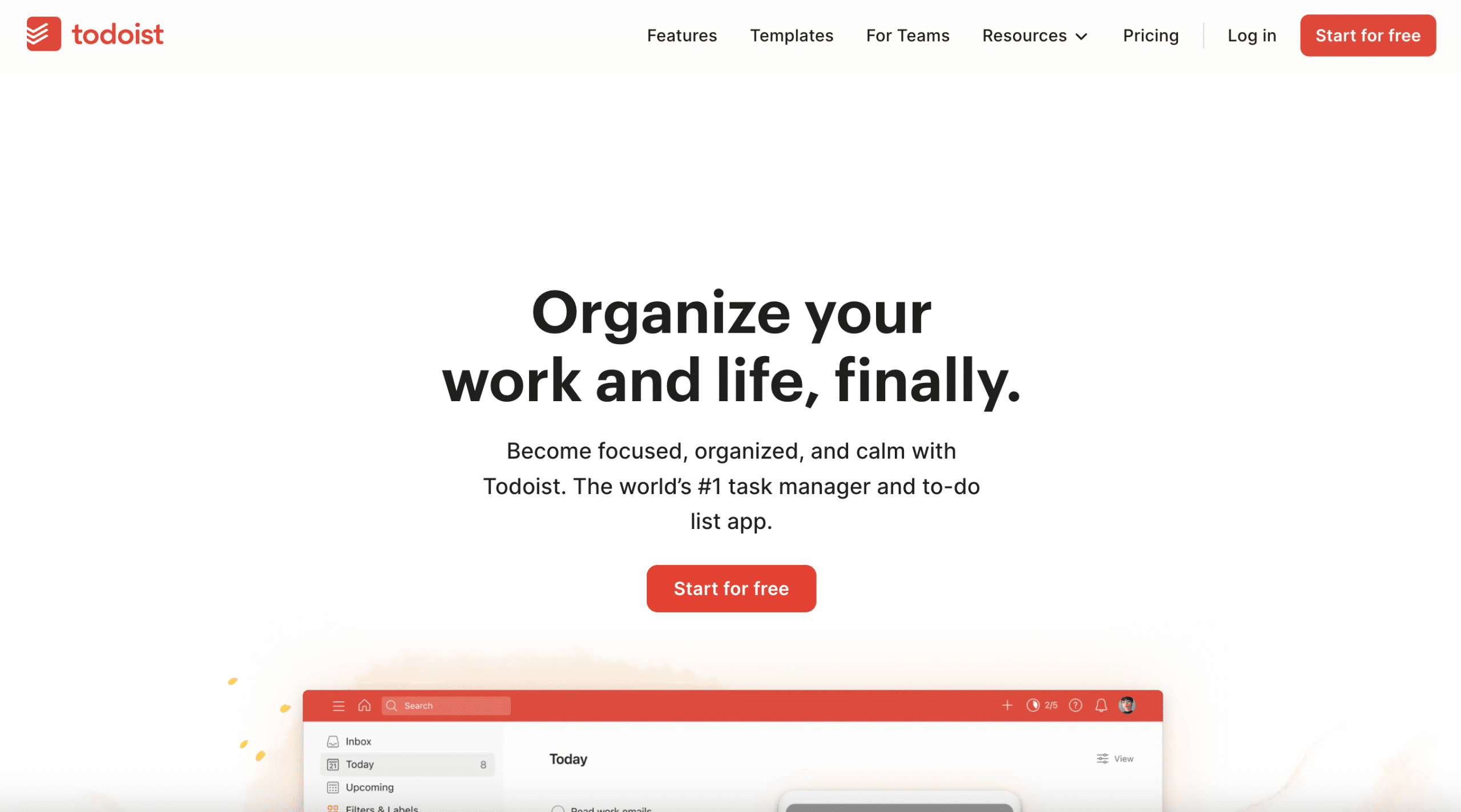
Todoist champions uncomplicated task management, proving that the software can be used effectively even by those with minimal technical skills. It offers a focused approach for organizing tasks, leading to productivity for teams and contributors.
Embracing its core functionality, Todoist provides features such as task priorities and reminders within an interface that strips away complexity. It’s about getting things done with intuitive and powerful tools tailored for anyone needing a straightforward task management system.
Pros:
- Quick task entry with natural language.
- Productivity tracking with Karma points.
- Multi-platform support for task management.
- Themes personalize the organizational experience.
- Free plan rich with essential features.
Cons:
- Only daily unfinished task reminders.
- The basic version comes with limited features.
- Collaboration can be less intuitive for groups.
- Absence of built-in time tracker.
- Some limitations with external app integrations.
Pricing & Plans:
- Pro Plan ($4)
- Business Plan ($6)
- Enterprise Plan (Contact Sales)
Customer Ratings:
- G2: 4.4 out 5 (768 reviews)
- Capterra: 4.6 out 5 (2357 reviews)
4. Trello

As an intuitive visual task management tool, Trello offers SMEs and startups the clarity and simplicity needed to navigate project complexities. It’s a platform where tasks transform into strategic steps, empowering even small groups to manage their workflows effectively.
Trello’s Kanban boards provide a crystal-clear layout that startups and SMEs find essential for monitoring progress and adapting quickly. This task management software is essential to promote versatility through drag-and-drop features, diverse board views, and mobile support.
Pros:
- Intuitive Kanban visualization.
- User-friendly task management software for small groups.
- It can be customized for various project needs.
- Free plan for cost-effective scaling.
- Collaborative tools bolster team synergy.
Cons:
- Customer support may vary.
- Absence of time/resource tracking.
- Costs rise with team growth.
- Adding team members is manual.
- Unsaved comments could be lost.
Pricing & Plans:
- Standard ($5)
- Premium ($10)
- Enterprise ($17.50)
Customer Ratings:
- G2: 4.4 out 5 (13442 reviews)
- Capterra: 4.5 out 5 (23070 reviews)
Related: 10 Best Trello Alternatives
5. Asana

Asana is a task management behemoth tailored for managing large teams, established by tech visionaries in 2008. It’s a centralized platform with unparalleled efficiency and integration capacity, catering to enterprise-level project and resource management.
The tool’s approach to task management is a testament to its design for scalability and detailed oversight. It offers portfolios for organizing projects, customizable dashboards for tracking progress, and resource management tools for optimal team efficiency.
Pros:
- Centralizes complex project management.
- Offers customizable workspace features.
- Enables detailed progress visualization.
- Advanced reporting identifies improvement areas.
Cons:
- Email notifications can overwhelm.
- User permissions setup is complex.
- Larger teams incur higher costs.
- Support integrations may need improvements.
- Automation favors extensive projects
Pricing & Plans:
- Premium ($10.99)
- Business ($24.99)
- Enterprise (Contact Sales)
Customer Ratings:
- G2: 4.3 out 5 (9530 reviews)
- Capterra: 4.5 out 5 (12310 reviews)
Related: 11 Best Asana Alternatives
6. Basecamp
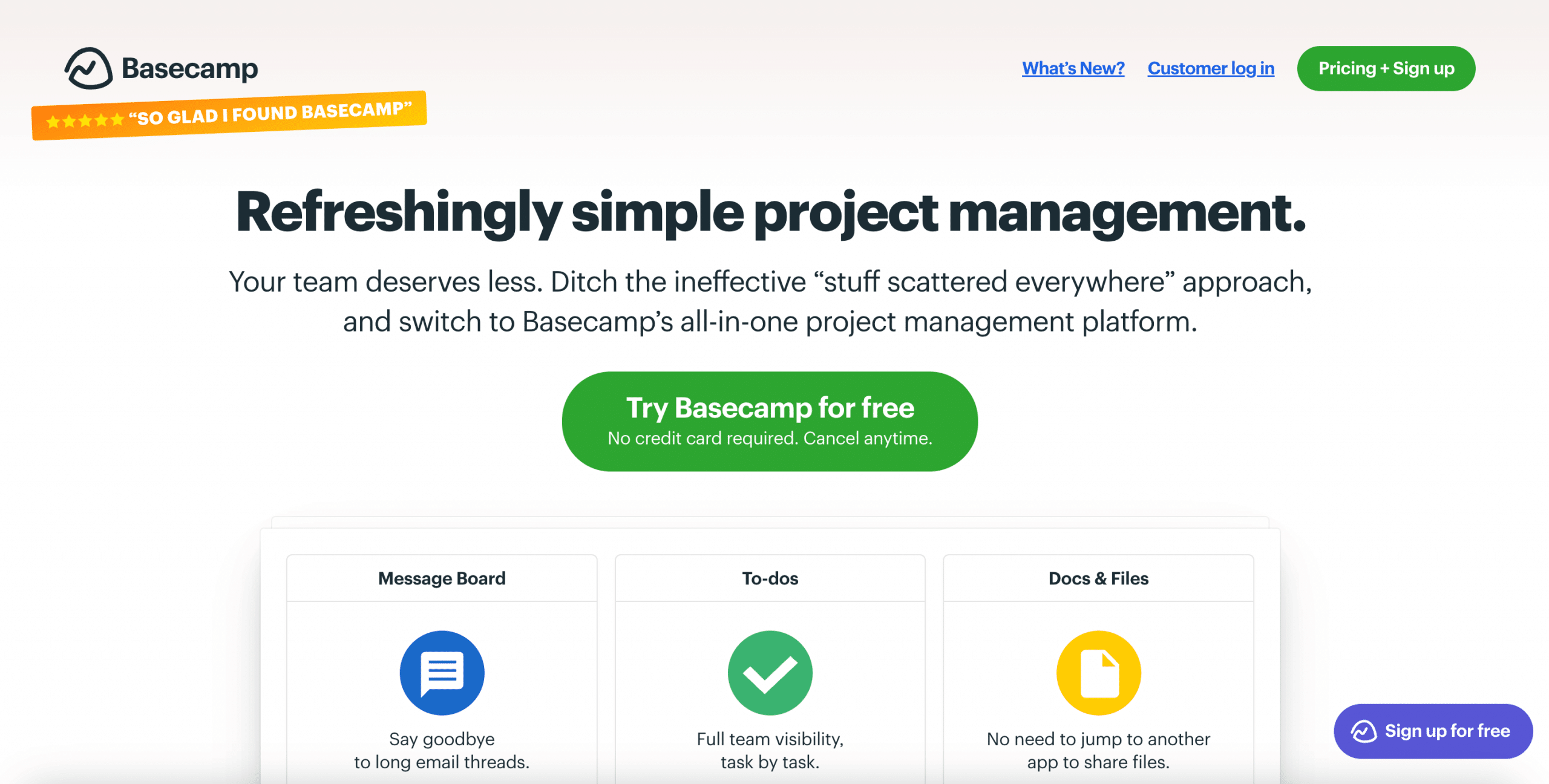
Basecamp revolutionizes project collaboration with its flat-fee pricing structure, making it a standout task management software that provides value for teams of any size. It streamlines task management, file sharing, and communication, all within an easy-to-use interface favored by millions globally.
The one-price model offers an all-in-one platform for unlimited projects. Its user-friendly design and focus on communication, including message boards and group chats, enable efficient teamwork. Flat-rate offerings pricing ensures that as teams use task management software, costs remain predictable and manageable.
Pros:
- Flat fee for all features.
- Scales with team and project growth.
- Simple, transparent pricing aids budgeting.
- An all-in-one tool enhances collaboration.
- Streamlines management on a single dashboard.
Cons:
- May lack depth for technical projects.
- Onboarding can be complex for some.
- Limited third-party integrations.
- Absence of dependency tracking.
- No built-in time tracking functionality.
Plans & Pricing:
- Basecamp Pro: $15
- Basecamp Pro Unlimited: $349
Customer Ratings:
- G2: 4.1 out 5 (5261 reviews)
- Capterra: 4.3 out 5 (14371 reviews)
Related: 10 Best Basecamp Alternatives
7. Wrike
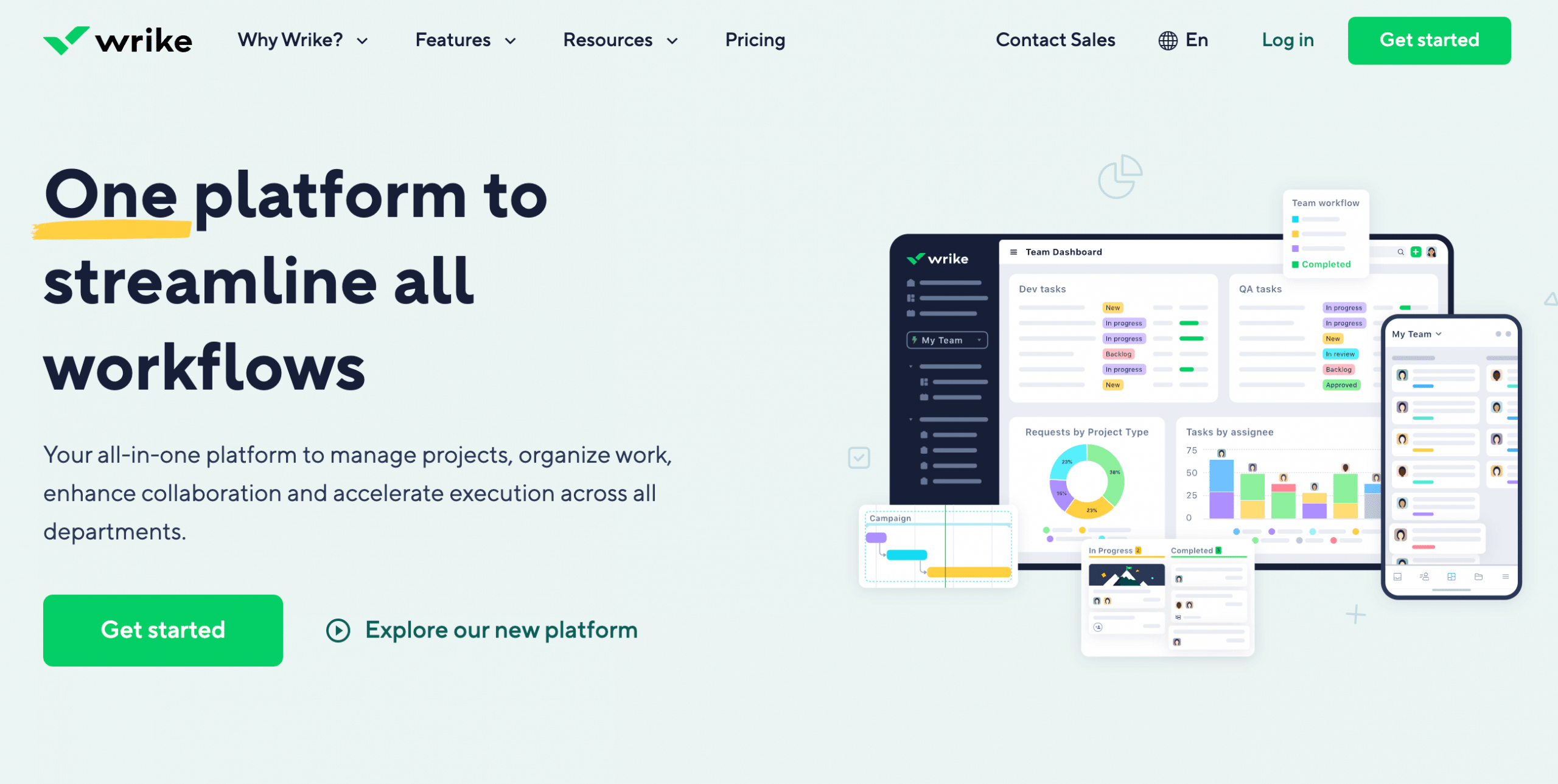
Wrike is a robust task management system for those seeking efficient progress tracking. Since 2006, it’s gained a diverse user base, including Fortune 500 companies and small businesses, by focusing on project management and collaboration.
Automating project progress calculation based on task completion and durations, this task management software allows for real-time insights. Features like customizable dashboards and Gantt charts visualize project timelines and activities.
Pros:
- Simplifies project processes with an intuitive interface.
- Strong customer support and service.
- Functional features for effective project management.
- Integrates with over 400 applications.
- Promotes teamwork with practical collaboration tools.
Cons:
- Issues with unauthorized charges and access.
- Non-intuitive interface for new users.
- Limited Agile and software development support.
- Inconsistent customer service was reported.
- Needs optimization for smaller screens.
Pricing & Plans:
- Free
- Team ($9.80)
- Business ($24.80)
- Enterprise (Contact Sales)
- Pinnacle (Contact Sales)
Customer Ratings:
- G2: 4.2 out 5 (3500 reviews)
- Capterra: 4.3 out 5 (2555 reviews)
Related: 11 Best Wrike Alternatives
8. Smartsheet
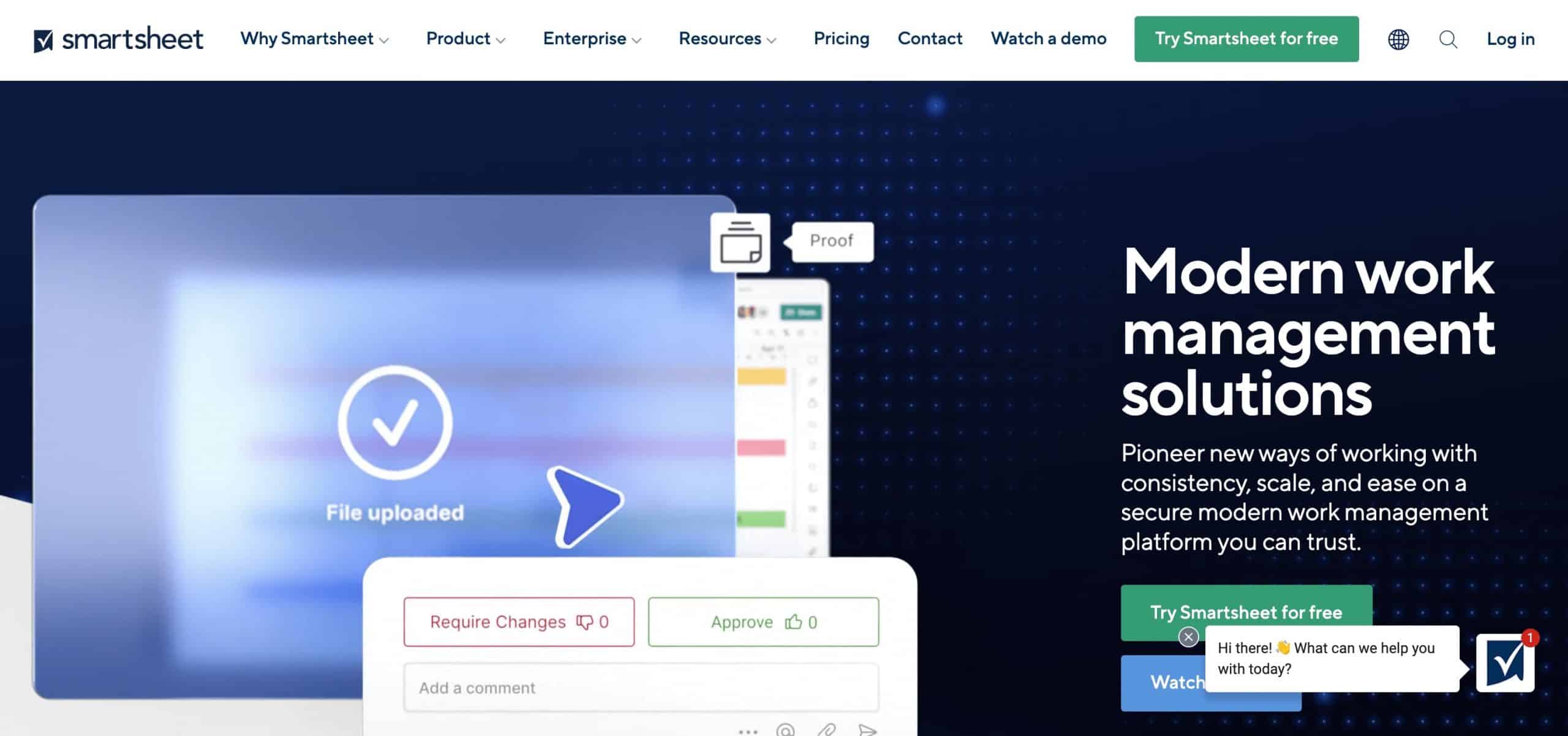
A favorite among spreadsheet-savvy users, Smartsheet offers a unique blend of familiarity and innovation in task management. It has a user base from small businesses to large enterprises. The spreadsheet-like UI helps Excel users transition to advanced project management tools.
Offering a suite of features that helps teams manage projects more efficiently, Smartsheet combines the ease of spreadsheets with powerful project management features. Its flexibility to adapt to different methodologies and customizable workflows makes it versatile.
Pros:
- Familiar and straightforward user interface.
- Compelling collaboration features.
- User-friendly mobile application.
- Advanced security with AES 256 encryption.
- Efficient task and deadline tracking.
Cons:
- Complex project report system.
- Lacks real-time communication features.
- No free version is available.
- Limited pre-built templates.
- Complex interface for some users.
Pricing & Plans:
- Free
- Pro ($7)
- Business ($25)
- Enterprise (Contact Sales)
Customer Ratings:
- G2: 4.4 out 5 (15137 reviews)
- Capterra: 4.5 out 5 (3120 reviews)
Related: 10 Best Smartsheet Alternatives
9. Teamwork

Teamwork, a management tool that lets remote teams effectively manage tasks and projects, was founded in 2007. Ideal for distributed teams, this platform focuses on task management, project planning, and collaboration to improve coordination and productivity.
As a task management software, Teamwork also centralizes project information, which is vital for remote collaboration. It offers real-time communication tools, customizable dashboards, and robust time tracking, which fosters accountability among geographically dispersed teams.
Pros:
- Real-time task and milestone tracking.
- Reliable project categorization features.
- Enhances team accountability and oversight.
- Robust budgeting and expenditure tracking.
Cons:
- Limited chart graph functionality.
- Pricey for small-scale organizations.
- Restricted Kanban automation functionality.
- No integration with leading CRM tools.
Pricing & Plans:
- Free
- Starter ($5.99)
- Deliver ($9.99)
- Grow ($19.99)
- Scale (Contact Sales)
Customer Ratings:
- G2: 4.4 out 5 (1072 reviews)
- Capterra: 4.5 out 5 (837 reviews)
Related: 10 Best Teamwork Alternatives
10. Ahsuite
Ahsuite, tailored for client collaboration and communication, is ideal for professional service providers. It offers an easy-to-use task management software with a secure, branded client portal. Its standout features include 256-bit AES encryption for file sharing and real-time collaboration tools that enhance security and client engagement. Additional tools like a password manager and template creator further enhance client interactions and project outcomes.
Pros:
- Intuitive dashboard with minimalist design.
- Simplifies client-business communication.
- Secure client portal for file sharing with Google Drive support.
- Built-in messaging for smooth communication.
- Supports task management functionalities.
Cons:
- A compact layout is needed to reduce white space.
- Documentation improvements are ongoing.
- Absence of a mobile application.
- Limited to four task dependency levels.
- Needs more extensive customization options.
Pricing & Plans:
- Free
- Professional ($24)
- Agency ($57)
Customer Ratings:
- G2: 4.8 out 5 (56 reviews)
- Capterra: 4.9 out 5 (19 reviews)
Conclusion
Any collaboration tool, whether free task management software or an all-in-one suite, can improve your team’s performance or bloat your processes. From this angle, choosing the right task management software tools can spell out whether you’ll reap the benefits of using task management or not.
Choose the task management tool that fits your three core operational elements: processes, teams, and client satisfaction. Check the Ahsuite Pro Plan 30-day trial, and harmonize these three elements to bring productivity to your team operations and client journeys.

